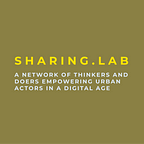Interview — Emmy Laura Pérez Fjalland
Emmy Laura Pérez Fjalland is a PhD student at the Danish Architecture Centre and Roskilde University. She is researching interdisciplinary and collaborative approaches to urban planning, governance and urbanism from a critical and empirical perspective.
What are the current discussions surrounding the ‘sharing economy’ that interest you, and why?
The discussions of what is the ‘right’ sharing economy. I believe the sharing economic models we know of today are just the beginning of what we will see in the future. The debate and development should focus on what kind of societies we want to promote and establish. As an urban planning researcher, I am looking into how different sharing economic models could work in a Danish municipal and urban context, where risk and responsibilities traditionally are shared, and hold a great responsibility to ensure a common good.
Different sharing economic models seem to be twisting our deeply rooted everyday life norms, and perhaps the new tendencies could be a tipping point towards a more sustainable way of living. However, in order to reach this, my current studies show that this change, requires strong political ambitions and actions, and cannot be left to the market and individuals alone. The sharing economy models should move beyond rental and on-demand logics.
I am very interested in finding out how we can become ‘able to sustain’ and ‘able to respond’ to climate change, and how different sharing economic models and platforms can reshape the structures and dreams of the ‘good’ life which are currently highly carbon-based.
What can we learn about collaboration from the ‘sharing economy’?
I think it is to soon to say, and it also depends on how you define the ‘sharing economy’ and collaboration. The platforms, products and services we ‘share’ vary much and involve very different levels of intimacy. Also the ideas of the enhancement of trust, which collaboration requires, seem to be a little off, replacing trust with some kind of superficially rated “reputation-trust”. However, I also notice how some sharing economy models provoke a more commons based lifestyle. I am very curios about the potential of these interpersonal-tech-digital-platforms ability to initiate some kind of trust, community and collaboration between so-called strangers, so they can use their time and skills to build stronger and more continues relations and trust. Whatever might happen, I believe the sharing economy platforms can give us new and rich knowledge about modern communities and collaborations, and what it is like to be a human in the 21st century.
How can we employ the ‘sharing economy’ to empower urban communities?
It depends on who you want to empower, and what kind of change you aspire for. Also, it’s influenced by how you define the sharing economy and what kinds of platforms and models are promoted. This is because studies of the social, economic, and environmental consequences of the different models vary considerably. For instance, studies of the access over ownership sharing economy models, e.g. co-use and co-utilisation of cars, apartments and tools, argue that they promote sustainable behaviour, while other studies argue that car-sharing and car-renting expand the car-use by increasing the number of people who can access a car, when they instead could be encouraging them to use other means of transport. Studies of the sharing economy, focusing on sharing and exchanging personal services, also argue that while it creates jobs for the jobless, it also build a highly risky (individualised risk) on-demand-talent-economy. So asking how the sharing economy can empower urban communities really depends on who you want to empower.
What is the future of the ‘sharing economy’?
Gazing at the current European political tune and state-of-mind regarding for instance refugees, is dominated by mistrust and fear, and in this context a more ‘sharing’ and ‘collaborating’ society seem deeply challenged on a bigger scale. But nevertheless, it depends on what kind of societies and cities we want to build and live in, and how this will be articulated, negotiated, and promoted.
This was originally published at sharinglab.dk
